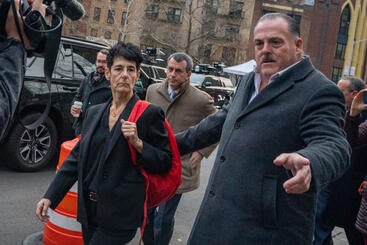
Sam Bankman-Fried (aka, S.B.F.), is a cryptocurrency CEO accused of duping more than a million investors. John Martin Fischer is a UC Riverside philosophy professor who is a world-leading expert on free will and moral responsibility. Fischer's ruminations on near-death experiences have been consumed by millions in his writings and on YouTube videos. Fischer disagrees with the writings of Barbara Fried, a Stanford professor and S.B.F.’s mother, who maintains that we are driven by accidents of biology and circumstance, and therefore are blameless for our actions. In the past for UCR News, Fischer has broached the topic of our moral responsibility in Ukraine.
Following is an essay John Martin Fischer has written for UCR News:
The fall of FTX cryptocurrency exchange resulted in the loss of approximately $8 billion of investors’ money. It is unclear that any of them will be “made whole,” or receive a good portion (or any) of their money back. Maybe they will have lost it all, and with it, their life savings, savings for a child’s college education, a car, retirement, and so forth. The suffering is mostly hidden from public view, but it is certainly there. You could say that former FTX CEO, Sam Bankman-Fried, is the crypto Bernie Madoff, as it appears that knowing wrongdoing, greed, and deception were at least parts of the reason for FTX’s downfall.
Despite the unfathomable pain of more than a million investors, Sam Bankman-Fried (S.B.F.) has largely avoided taking responsibility for his actions, deflecting much of the blame on clients for, in his view, taking unreasonable risks. He has pled not guilty to various charges surrounding the collapse of FTX, notwithstanding the guilty pleas of former associates in the company. He admits FTX should have had mechanisms in place for risk management to protect its clients. He claims the issues that brought down his empire were unintentional mishaps, not intentional wrongdoing.
In a New York Times interview, S.B.F. concedes he “screwed up,” and that he failed to fulfill his responsibilities as the CEO of FTX. He also stated, about the time immediately after the collapse and arrest, “I’ve had a bad month,” and, despite the admission of failure, his behavior since his arrest has not evinced any sincere admission of guilt. He certainly has not taken responsibility for his behavior in any significant way, preferring to deflect it onto others.
S.B.F. was arrested the day before he planned to testify before Congress. An article in Forbes magazine states, “But for all his supposed soul-searching, Bankman-Fried planned to spend much of his time in front of the U.S. House of Representatives Committee on Financial Services blaming others for the implosion of FTX, and the situation he now finds himself in.”
S.B.F.’s mother, Barbara Fried, and father, Joe Bankman, are Stanford University law professors. She (now emerita), has written on moral and political philosophy and was formerly affiliated with The McCoy Family Center for Ethics in Society. His father is in tax law, and is also a licensed psychologist who helps students deal with the pressures of law school.
She has published an article “Beyond Blame,” that appeared June 28, 2013 in Boston Review. Her piece is published with this epigraph attributed to her: “The philosophy of personal responsibility has ruined criminal justice and economic policy. It’s time to move past blame.” She goes on to write that most research (including that of James Q. Wilson) shows that “our worldviews, aspirations, temperaments, conduct, and achievements — everything we conventionally think of as ‘us’ — are in significant part determined by accidents of biology and circumstance.” She also claims that, “in the United States parental income and education are the most powerful predictors of whether a 3-year-old will end up in the boardroom or in prison.” She concludes from all this there is no free will, and no moral responsibility. The father, Sam Bankman, is a proponent of the economic analysis of law, which significantly downplays moral responsibility.
It is perhaps a dark irony that, given his parents, S.B.F. may well end up in both a boardroom and prison!
Maybe Barbara Fried is right about what might be called “parental determinism,” but I seriously doubt it. Note that it would get S.B.F. — not her — off the hook, but then our attention would turn to her parents, and so on.
The alleged fact about our nation is that “parental income and education” are the relevant indicators. But who could score higher on education than S.B.F.’s parents? They lived for a significant period of S.B.F.’s youth in a house on the Stanford campus — described as a “ritzy mansion” worth $4 million. Neither a lack of parental education nor poverty went into the mix that led S.B.F. down the road to alleged corruption.
In the forum in Boston Review of which Fried’s "Beyond Blame" was the lead article, the Princeton philosopher Gideon Rosen ironically pointed out the following implication of her view. “Consider the banker who bundles worthless mortgages and hawks them to unsuspecting clients. Stipulate that he is blameless for Fried’s reasons, and ask, can we legitimately punish him for his fraud?” Rosen points out we couldn’t. Her son was not a banker, but allegedly a swindler nevertheless. How convenient: On her theory, S.B.F. is not only morally blameless, but immune from punishment.
Rosen also calls Fried’s arguments “universal acid,” by which he means they imply that no one could ever be morally blamed or punished. Or, for that matter, morally praised and rewarded. We couldn’t blame or punish Putin or (if we had been able to) Hitler. We couldn’t blame or punish rapists, serial killers, sexual harassers, or… anyone.
Fried calls those of us who believe in human free will and personal responsibility (and it’s fit with scientific explanation of human behavior), “blame mongers.” Really? Isn’t it more the insistence that justice be done?
On the “no-personal-responsibility” view, we couldn’t praise and reward Chesley (Sully) Sullenberger or any of the many people who show us kindness or save our lives (in so many ways). No free will, and thus no moral responsibility, punishment, or reward. S.B.F. would be no different from Sully Sullenberger, no less a hero. Universal acid, indeed, and a pernicious doctrine, if it makes its way — in its florid and unqualified form — into childrearing.
So, Barbara Fried: meet the boys in the boat.
Daniel James Brown’s book, "The Boys in the Boat," tells the true story of a group of young men (“boys”) who grew up in poverty and hardscrabble towns during the depression, many of whom from troubled families, who attended the University of Washington and eventually won the gold medal in rowing at the 1936 Olympics in Berlin (“Hitler’s Olympics”). On their way, they beat the great teams from the elite East Coast universities, such as Harvard and Yale, and their West Coast rival, the University of California, Berkeley.
One of the main characters, Joe Rantz, came from a working family in a small town. His mother died when he was very young, and his father remarried and had several children. One day they simply left Joe, who was then an adolescent, to fend for himself. His story, like all the young men’s, was an extraordinary triumph of the human spirit — the human will — in the harshest and most challenging circumstances. Nothing kept them back—not poverty, dysfunctional families, personal tragedies, the difficulty of getting a job in the depression, or the extreme difficulty of the sport of rowing. Somehow — somehow! — they made it from the fog of Lake Washington to the bright Olympic torch in Berlin.
Billy Strings is a contemporary “boy in the boat.” He was born William Lee Apostol in Lansing, Michigan, in 1992. His aunt gave him the name, “Billy Strings,” when she noted his abilities with various bluegrass instruments at a young age. His father died of a heroin overdose when Billy was 2. His mother remarried and moved to Kentucky and then a very small, poverty-stricken town in Michigan: Muir. While he was a pre-teen, his parents became addicted to methamphetamine. He left home at 13, himself going through a period of hard drug usage. His parents were able to achieve sobriety, as did Billy, and he has gone on to an extraordinary career as one of the best bluegrass musicians of his generation. Rolling Stone called him a “bluegrass prodigy,” and he gives hundreds of concerts at top venues throughout the U.S. and Europe each year.
Billy and the boys in the boat are just examples of the extraordinary power of human free will. People rise up and transcend even the most horrifying conditions. Every one of us knows people who have been abused as children, grown up in grinding poverty or broken families, suffered from hatred based on the color of their skin or sexual orientation. Some are destroyed by this, but others will not succumb, no matter how hard the challenges. Every one of us knows a William Apostol or Joe Rantz, perhaps unsung, but heroes, nevertheless.
Some may contend that there is something that differentiates those who succeed in escaping the shackles of their past circumstances and those who don’t — something that is hard to detect but is a determining difference-maker, that is, a difference-maker that determines different outcomes. We just can’t see it. This seems implausible to me: an ad hoc hypothesis invoked to save a theory one holds dear. There are just way too many who have faced obstacles — terrible and trivial — and overcome them to become stable, productive, happy, and loving people.
I know people who were abused when they were young and have become close friends and even loved ones. I’ve asked them how they did it — how they’ve come so far in life, when many are crushed, and (in some cases) how they’ve become such wonderful parents. It is interesting that several of them have said, “I just decided I wouldn’t be destroyed, and I decided not to be like that.” I wonder where they get the capacity to shed their past. Stephen Daedalus said, in James Joyce’s "A Portrait of the Artist as a Young Man," “The past is a nightmare from which I’m trying to awaken.” It is often difficult, but we can do it through sheer force of will. We can dream of something better.
For reasons totally out of their control, morality and virtue are much harder for some than for others. Similarly for happiness. It comes easily for some, but it is much harder for others. Difficulty, however, is not impossibility, and life’s unfair. We all struggle with challenges that come from factors out of our control. Life’s unfair, but we have to play the cards that are dealt us.
Consider: Joe Rantz and William Apostol grew up in terrible poverty and emotional chaos, with parents who did not get a college education. Rantz’s father left him abruptly, and Apostol’s died of an overdose. Contrast them with Sam Bankman-Fried, who had all the advantages of wealth and well-educated parents. Who would you predict would commit terrible crimes that would hurt millions, and who would make us all proud and reach our hearts with song? If you deferred to Barbara Fried and James Q. Wilson, and others who deny personal responsibility, you’d be wrong.
Feature photograph by Michael M. Santiago / Getty Images




